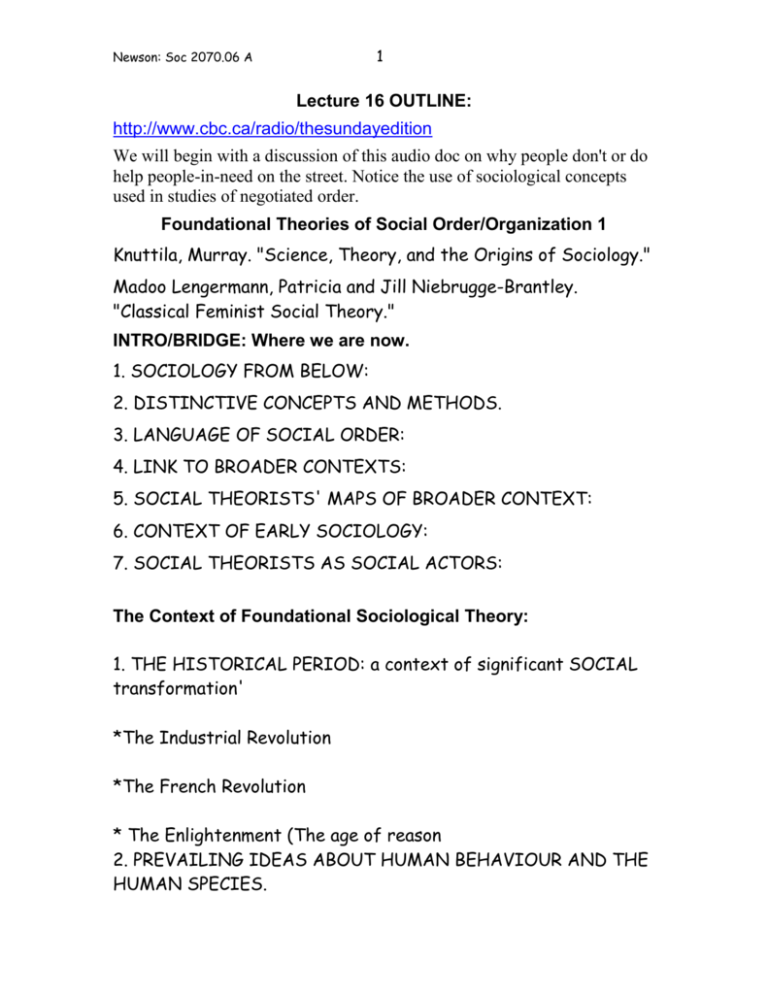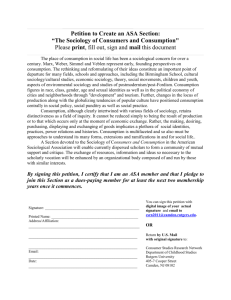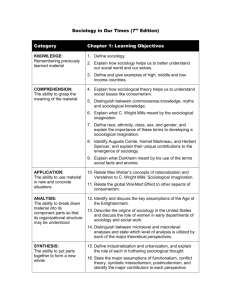Lecture 16 Outline
advertisement

1 Newson: Soc 2070.06 A Lecture 16 OUTLINE: http://www.cbc.ca/radio/thesundayedition We will begin with a discussion of this audio doc on why people don't or do help people-in-need on the street. Notice the use of sociological concepts used in studies of negotiated order. Foundational Theories of Social Order/Organization 1 Knuttila, Murray. "Science, Theory, and the Origins of Sociology." Madoo Lengermann, Patricia and Jill Niebrugge-Brantley. "Classical Feminist Social Theory." INTRO/BRIDGE: Where we are now. 1. SOCIOLOGY FROM BELOW: 2. DISTINCTIVE CONCEPTS AND METHODS. 3. LANGUAGE OF SOCIAL ORDER: 4. LINK TO BROADER CONTEXTS: 5. SOCIAL THEORISTS' MAPS OF BROADER CONTEXT: 6. CONTEXT OF EARLY SOCIOLOGY: 7. SOCIAL THEORISTS AS SOCIAL ACTORS: The Context of Foundational Sociological Theory: 1. THE HISTORICAL PERIOD: a context of significant SOCIAL transformation' *The Industrial Revolution *The French Revolution * The Enlightenment (The age of reason 2. PREVAILING IDEAS ABOUT HUMAN BEHAVIOUR AND THE HUMAN SPECIES. 2 *that human nature is fixed/unchangable. *that the workings and organization of the common units of social life could and should be understood in terms of human nature. * ideas about the kind of social and political arrangements that were needed to accommodate to the rigidity of human nature. 3. THE SOCIOLOGICAL CHALLENGE: *human nature is variable and changing; *social groupings and the interactions take place within them and between them not determined by human nature. *the social realm has “emergent properties.” * By changing social forms, you can also change human nature. * August Comte saw sociology as a tool for restoring stability by adopting scientific knowledge and its application as its key ingredients. 4. DIVISIONS AMONG SOCIOLOGISTS: *differences around what sociology's central project should be and how it should pursue it: * build intellectual and academic credibility as a science, OR reform or change social arrangements 3 * look for general social laws and techniques for measuring them, OR discover how people live their lives in different ways on the ground? 5. THE MALE/FEMALE DIVIDE: * women classical theorists wanted to propel sociology down a different path to most male theorists. ".... classical women theorists were important public figures and known as social analysts to the men who created mainstream sociology in the period 1830-1930; ... that male discourse group was at best ambivalent and more typically resistant to the women's presence and sociological production, largely because sexist attitudes made it difficult to accept women's intellectual work as authoritative; ... these same dynamics, coupled with a growing contrast between the aspirations for an objective and generalizing science in male sociology and the critical, activist, grounded formulations of classical feminist thought led, over time, to a complete erasure of this tradition's presence from the histories of sociology created out of various male historiographical frameworks;" (p. 126 of the reading by Patricia Lengerman& Jill Niebrugge-Brantley, on p. 328 of the reading kit.) NOTE: A similar pattern in the development of sociology as a discipline can be traced by attending to differences between the work of white intellectuals and commentators versus intellectuals and commentators of colour. 6. EARLY SOCIOLOGY REFLECTS AN ERA OF SOCIAL CHANGE (SO WHY FOCUS ON SOCIAL ORDER???): 4 political changes economic changes technological changes geographic changes cultural changes 5 LECTURE 16: CONCEPTS EUROCENTRIC THOUGHT; THE ENLIGHTENMENT; THE INDUSTRIAL REVOLUTION; THE FRENCH REVOLUTION; CULTURAL DIVERSITY; HUMAN NATURE; EMERGENT PROPERTIES; MALE/FEMALE DIVIDE; 6









